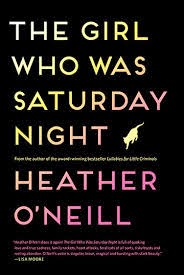So RR and I decided to do another of our Co-habitational Reading Challenges. If you’ve followed along in previous years, you know this is where she and I read the same book at the same time and then blog about the experience. This time round, we wanted to choose one of the books on this year’s Giller short list. Happenstance found me purchasing a copy of Heather O’Neill’s The Girl Who Was Saturday Night (her follow-up to Lullabies for Little Criminals) at the same time that RR was taking it out of the library. So that sealed the deal on which book we’d pick.
Unlike in previous editions of the Co-habitational Reading Challenge, we completely failed to blog about the reading experience in real time. Our lives have just been too dang busy this fall – what with me doing a variety of promotion for Sad Peninsula at the same time that I’m working a busy day job AND writing a new novel, and her working a busy day job and doing hefty rewrites on the novel-in-stories she is slated to publish in 2016. ALRIGHT THEN – shameless self promotion out of the way. We more or less finished the book at the same time last week (I was about a day and a half behind her) and shared our thoughts with each other along the way, even if we failed to share all those thoughts with you.
Anyway, we both liked the book a lot, though found it flawed it all kinds of slight but obvious ways. With the creation of Nouschka Tremblay, O’Neill proves beyond a doubt that she is a master of the flakier-than-thou narrator. Nouschka, positioned in some unmentioned period in the future, is relaying the story of her and her twin brother Nicholas being 20 years old and living in Montreal around the time of the Quebec referendum in 1995. The two of them, inseparable for the first chunk of the novel, are celebrities by default: their father is a famous folk singer named Etienne Tremblay (completely unknown in English-speaking Canada) who used to bring his children on shows only to abandon them to pursue his career, but still pays intermittent visits to their lives when he’s in between gigs.
Young Nouschka pursues (or is pursued by) a number of men in her rundown neighbourhood in Montreal, but ends up marrying a handsome, alluring ne’er-do-well named Raphael. Meanwhile, Nicholas falls in with some rather nasty characters and eventually plans a bank heist. Along the way, Nouschka falls pregnant, finishes her long-delayed high school diploma, finds her true calling in life, and learns more than a thing or two about familial love.
With its cast of quirky, off-kilter characters, this novel aims to charm, and for the most part it succeeds. There is a certain narrative energy to seeing the world through Nouschka’s perspective. Even the most mundane interactions become charged with a kind of mythic quality: the visiting of a strip club, the taking of night courses, a stroll down a Montreal street in blistering winter. Nouschka lends a certain magical quality to it all. The Girl Who Was Saturday Night is about a young woman who is aware of her flaws and the flaws of her family but still aims to hold things together while trying to carve a place out for herself in the world – that evergreen theme of finding individual agency while at the same time recognizing collective obligation.
For all its compelling ups and downs, this novel did leave us scratching our heads at times. There were the repetitive appearances of cats throughout the first part of the book that didn’t really amount to much. The opening section is pretty slow: the real “plot” doesn’t start to unfold until the last third of the book. We’re never sure from which period Nouschka is telling her story, as the whole narrative is framed like one giant flashback. And we’re still not entirely sure what the title of the book means either.
But overall we enjoyed The Girl Who Was Saturday Night well enough and were glad we picked it for the Challenge. It was fun discussing what we thought of Nouschka’s various choices through the story and how she kept things moving along. This won’t be the last time RR take this Challenge, so stay tuned to our blogs to find out which book we’ll do next.
Subscribe to:
Post Comments (Atom)


No comments:
Post a Comment